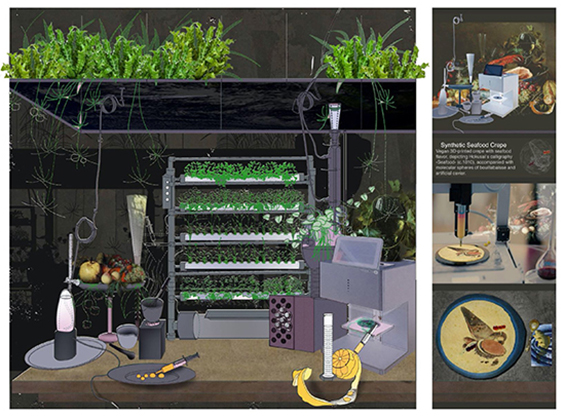The Future Food Deal Open Call
POSTED ON: March 18, 2022

The Future Food Deal Open Call. Image by stuudiostuudio (TAB, 2022).
The 2022 Tallinn Architecture Biennale (TAB), co-curated by Cooper Union Professor Lydia Kallipoliti, has recently announced The Future Food Deal, an open call that invites students and recent graduates to contribute their design proposals to a compendium of cookbooks and manuals for sustainable food futures.
The open call is one component of the work to be explored in the Tallinn Architecture Biennale at large, whose theme “Edible, Or the Architecture of Metabolism” deals with the relationship between architecture and the metabolic relationships that produce fuel, waste and nutrients. Professor Kallipoliti’s seminar at the Cooper Union during the spring 2020 semester offers a glimpse into the types of issues, work, and research that will correlate with the biennale exhibition that opens on September 7th, 2022, in Estonia. Ranging from the architecture of food systems, to new building materials made of edible materials, to geopolitical questions related to circular economies, TAB offers a range of responses to the spatial and existential connections between architecture and food that surface in different scales: from the stomach to the territory and the ways in which we process mentally the journey of the edible arriving to our table. TAB explores how architecture can use its expressive capacity to investigate and act upon metabolic relationships, digestion, and the generation of resources.

The Future Food Deal open call is an opportunity for students to imagine new futures that deal explicitly with how architecture can produce food and also be eaten away. Given that the global food system in its entirety is the world’s second largest emitter of greenhouse gases, and our collective need for food continues to grow significantly in response to urbanization, questions about our food systems demand the attention of spatial practitioners. People become increasingly alienated from their sources of provisions, fostering a paradigm that reinforces carbon dependencies. Architectural thinking is thus positioned with the opportunity to imagine future scenarios that respond to this ever-growing gap between eater and eaten.

With a focus on the urban and architectural implications of food systems (production, distribution, consumption, decomposition) and the urgency for productivity in cities, the Future Food Deal open call aims to present alternative futures that explore the principles of kinship, interspecies alliances, circularity, and localization, and to ask what new rituals, practices and architectures can emerge from the networks of food production, consumption distribution, and decay. The open call’s curatorial team seeks a diverse range of projects developed in the form of cookbooks and manuals that will constitute new guidelines of food-driven and food-oriented projects within design disciplines. Students from the Cooper Union, and spatial practitioners at large, are encouraged to submit their work.

The full submission details for the open call are available on the 2022 TAB website (https://2022.tab.ee/futurefooddeal/). Please also visit the 2022 Tallinn Architecture Biennale website (https://2022.tab.ee/about/) to explore the full roster of events and exhibitions that are slated to open this fall.
The Future Food Deal open call is organized by the curatorial team of the upcoming Tallinn Architecture Biennale (TAB) “Edible, Or, The Architecture of Metabolism” opening in September 2022. TAB 2022 is curated by Lydia Kallipoliti and Areti Markopoulou in collaboration with assistant curator Sonia Sobrino Ralston.





